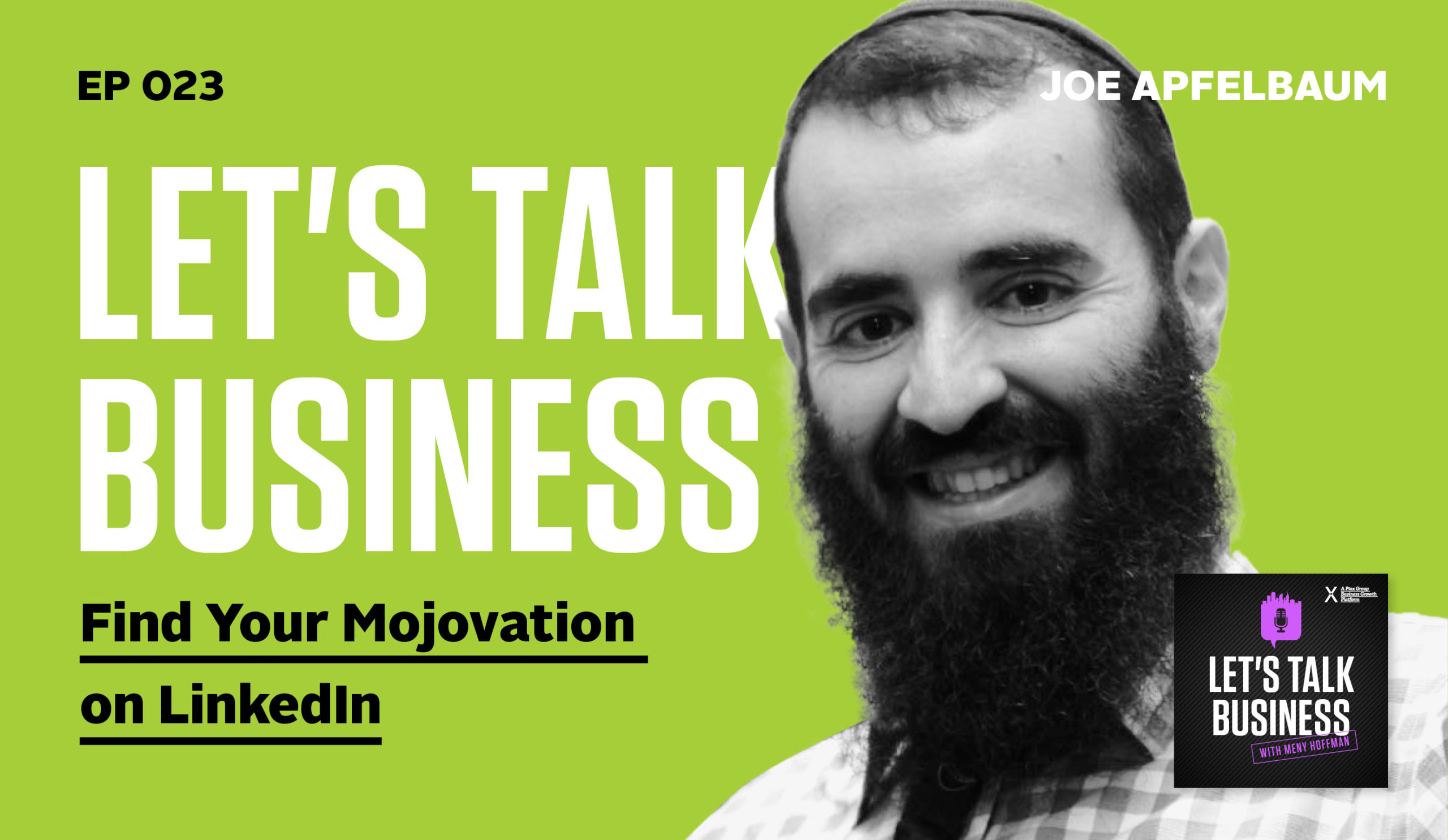Be on the right career path, the one that makes you happy. Tune in to this episode with career consultant Shaina Keren for tips and advice.
Do you LOVE your career? It’s such a simple question, but I doubt most people find it easy to answer.
If you’re struggling to find what’s missing in your professional life, I’m excited to share this interview with my guest, Shaina Keren. Shaina is a career consultant specializing in helping people discover and create careers that truly align with their natural talents, deepest interests, and lifelong goals. She also advises business owners on how to find and hire the most qualified individuals for their team, and how to keep the right people in the right positions. The more I learned about Shaina’s win-win approach for growing companies and aspiring job-seekers alike, the more I realized it’s time to bring her on the show.
In our interview, Shaina shares some tried-and-true methods that help her clients discover their best career paths. She also explains how anyone already employed can add more value to their company and move up the corporate ladder. Finally, Shaina addresses the employer’s perspective on hiring, how they can ensure they’re interviewing and onboarding the right candidates, and training them to achieve success.
I gained so much from this interview that I cannot wait to share it. Listen and enjoy!
Listen to the podcast here:
Download the audio file here.
Discover the Career You Love—with Shaina Keren
—
Shaina, thank you so much for joining me on the show.
Thank you. It’s a pleasure to be here.
I’ve been seeing your work on LinkedIn and I met you at a couple of events in the past as well. We got introduced by a good friend of ours and of the show as well that told me that I should speak to you. We had a great call and after the call, I decided that it’s time to bring you on the show.
Thank you. I’m very excited to be here.
Let’s give our audience the short version of what you’re doing, then we’ll get into how you got to it, and giving people some no-nonsense advice on this topic.
I’m known as a career coach, career consultant, and my focus is helping people figure out what they’re really good at and then how to make a successful career out of whatever it is that they enjoy doing.
Tell me a little bit more about how you got into this business. Nobody wakes up one day and says, “I want to become a career coach.”
[bctt tweet=”When you really know what you’re good at, you will be the best in the field.” username=””]
Right, “overnight,” which is always ten years in the making. Like most career coaches, I struggled with trying to figure out what I wanted to do. I went the very traditional route of graduating high school, going and getting a Master’s degree. I got a degree in Education, which seemed the logical choice at that time, but without putting a lot of thought into it. I had never heard of a career coach. I didn’t know that there are assessments that you could take that could predict your skills. I went into the field, I graduated, got a series of good jobs, but I kept finding myself very bored with what I was doing, unstimulated and looking for what’s next. That led me to figure out what assessments are, what career coaches do, how you can figure out that there are ways to predict what you’re good at, what kind of work you’re going to enjoy. Eventually, to make a long story short, I felt like there are such easy, clear answers, and this is something that I want everyone to know.
The reason why I brought you to the show is that I feel although people think that this topic is related only to somebody who’s looking for a job—and that’s an important part, we’ll talk about it—but careers could be also how you’re moving up your ladder in the company you are in. Careers are to make sure that you continue to feel fulfilled in what you’re doing. But more importantly, with being in this interesting time with the pandemic hitting, there’s so much uncertainty going on in companies and businesses, and people are always questioning their core. I figured that let’s have a conversation and try to gain some of your knowledge, and what you share so happily as I see online.
Let’s dive into this topic and start off with a singular person. I’m going to give you a scenario that I heard a thousand times. Somebody told me that he’s out of a job for six weeks and this was through WhatsApp. He asked me if I could help him. I said, “Let’s meet up for a few minutes.” The first question I asked him is, “What do you want to do? What do you like doing?” He says, “I don’t know. I just want to make money.” You’ve probably heard this a thousand times or even more. Break down the steps—and I know the answer to this, but I would love to know from you—how you explain it. Why that alone is not the right answer?
I get messages like that all the time on WhatsApp on LinkedIn. This woman messaging me, “I need a job. Can you help me?” I say, “What are you looking for?” We go back and forth a few times. She insists that she’ll do anything and she’ll take any job. She just needs to pay the bills. I’m sure if we would sit down, we would figure out the steps. It’s straightforward. The basic things that we want to know are, what’s your personality type? What skills do you naturally have? If you have any experience, we’ll find the transferable skills. You might not think that you spent a job doing customer service that you have any skills that you can use. I am certain that if we sit down, we will find skills that you could apply to a variety of jobs.
Figuring out if you have an experience where you could apply that and what you enjoy doing. When we get down to the bottom of asking a question, and this is something that readers can ask themselves. It’s getting in the flow state. When you find something where you forget that you’re tired and hungry, which I’m sure you’ve experienced in your work. I experienced that all the time where I’m focused on something and I find that I’m enjoying the process, that time seems to disappear.
Every single person could find that thing and then we can figure out how to apply that to their work. It’s interesting because you mentioned the pandemic and how that affected people. I’ve been encouraging individuals before the pandemic, but especially now to look at themselves as a brand, as a company. A company like yours, for example, I’m guessing that you don’t consider yourself to have any competition, because if you really know what you’re good at, what makes you unique, what makes you special, there isn’t ever anybody else in the world who can do that.
There’s a line that I use many times which is that, “We don’t have competition. We might compete on a project because the client decided to go somewhere else, but it doesn’t make us as an agency or as a company that we have competition. They decided that the value that we bring to the table is maybe not suited for their needs at the moment.”
Translating that great line, you might have competition in the job market. There might be somebody else competing for the same job but your value, there is no one who could compete with that because you’re naturally born with characteristics, interests, abilities, talents that don’t exist for anyone else on the planet. When you look at yourself that way, it doesn’t matter if it’s a flooded market or if people in this field don’t generally earn that much, that’s all irrelevant when you know what you’re good at. Because if you do, you will be the best in the field, and then you will find that the market’s running after you, even in crazy times like these.
What is the process for a person to identify the basics of it? If somebody needs real help and they want to work with the career coach then that’s the direction they go. If somebody is sitting at home or reading to this at the moment, or even somebody that’s sitting in a job and thinking, “How could I get the most out of my career?” What are the basic steps a person does in order to at least identify the basics?

A lot of people are familiar with their personality type, the Myers-Briggs, MBTI. If they’re not, that’s the first step. I have a quiz on my site ShainaKeren.com. There’s a big button with the quiz. If you want a multiple-choice type of quiz, it’s 16Personalities.com. If you know that, then that’s already been narrowed down for you. Although we’re also unique, we’re also similar. A lot of people don’t like the notion that they could fit into 1 of 16 categories. They feel like, “I don’t fit into any box.” Funnily enough, every single person who I’ve met, we have been able to put them into a category because there are certain rules and framework that humans all follow.
Knowing your personality type is one thing. Knowing your values is super important when you’re looking for a job. This could be as simple as writing down what’s important to you. You can Google values checklist. There are lots of great activities you can do online to figure out, “What are your top two values?” Is it honesty, schedule, knowing what you’re going to do in advance, or whatever your values are and making sure that the workplace is going to fit that. I would go to taking a Holland Code test. There are lots of free ones available online. 123Test.com/career will give you a good Holland Code assessment, which is going to put you into 1 of 6 categories and will give you a code that tells you, “Are you more social? Are you more investigative or more practical?” Doing all of those things is a good starting point. Someone who knows all that about themselves will be able to make a much better decision on their own.
I speak to many people on many different occasions and a lot of times those tests back a person in, and all of a sudden, for the rest of their life, they almost find a reason for, “Why I’m not moving fast enough? Why I’m not demanding more from myself because I’m a circle, I’m a box, I’m in this color, that color, I’m an introvert, extrovert.” My opinion on those tests is great to validate something. They’re also great to complement a direction, but it’s not the only thing that you have to look at. It’s part of a persona, no?
Even when I sit with somebody, everyone I find does have a North Star and internal compass, but when we get to know ourselves, we know what’s right. When we hear advice, we have to be able to have an internal check that we know if it resonates with us or not. Number one, when you hear advice from a test, a coach or anyone, it’s up to you. It’s your life. I tell my clients, “At the end of the day, I can give you this advice, but I’m not going to pay your bills. If this doesn’t work for you, it’s your decision that you’re going to have to live with. Make sure that you’re doing what’s right for you.” To address what you asked about using it as an excuse is a good point.
For example, I could say, “I have this personality type. I’m not naturally organized.” Forget about doing things or following schedules. I look at it as the most raw version of yourself. Whatever your test results are, it’s not the work done version of yourself. For example, in the Myers-Briggs, we test for people who are more naturally organized or more spontaneous and who resist that. People who resist that don’t have the excuse, but I believe they should give themselves the understanding that, “I’m not naturally organized. That means that I need to use my calendar, notifications, and plug all those things into my life so that I can be more productive.” Not as an excuse but knowing what I was given to work with.
The reason why I mentioned this is because the one thing that I always hear is people using recklessness or risk tolerance with an excuse that, “I’m an entrepreneur.” You can’t use entrepreneurship as an excuse for mistakes, failures, and stuff like that. As an entrepreneur, you might fail and pick yourself up and move on, but recklessness or taking somebody’s money and investing, without knowing exactly how this is going to work out and saying, “This is exactly entrepreneur,” and even giving yourself some names from out there that made billion-dollar companies and how they grew. It’s not an excuse. I felt I have to say it because when it comes to those tests, sometimes if the person doesn’t know how to read those results and nobody’s guiding them of what it’s telling us, they sometimes use this as an excuse.
Let me move on to even understanding this to the next level, which is another thing that I want to get your opinion about. People also sometimes confuse soft skills with hard skills. You could speak to someone, let’s say they had two jobs. There are two years in the workforce and for whatever reason, it didn’t work out, and now they’re looking for a new job. They might be limited to either soft or hard skills that they have not yet developed. All of a sudden, they’re looking for other opportunities and saying, “I’m looking for something that I could use exactly my skills that I’ve used in the last two jobs.” But there’s so much more you could learn and become good at even on the new job. How do you evaluate your current state of mind with the potential that you have as a person?
It’s interesting because the growth mindset is a popular term these days. It comes into play a lot with the answer to that question because over 80% of skills are transferable, but what determines your success is so much more your emotional intelligence, growth mindset, and knowledge that you can continue learning. People with higher emotional intelligence, which goes hand-in-hand with knowing how to develop their soft skills make on average per-point of emotional intelligence of like another $13,000 a year in the same job. I believe that people should look at their past experiences to give them a little bit of information. Imagining like a pie chart, that’s going to be like a little slice of pizza.
The knowledge that you have the natural skills, for example, you’re good at problem-solving or diagnosing problems. Because you’ve only diagnosed tech problems, does that mean you won’t be able to diagnose financial problems? I don’t think so. You should recognize where your real qualities lie and then look at those experiences as a small application of what you can do. This is where aptitude testing comes in. People confuse personality tests with aptitude tests. I’d like to differentiate. Personality is a set of characteristics, and aptitude is the cognitive abilities of your brain.
[bctt tweet=”Someone who knows all about themselves will be able to make a much better decision on their own. ” username=””]
Are you good at Math? Are you good at problem-solving? Do you have a good sense of design or not? Do you think spatially or non-spatially? These are things that we test and that I use with my clients when we’re doing career testing, and whether they’re 18 or 57, we use this test to inform what their capabilities are. We could come out with results that say, “You were a computer programmer your whole life, but did you know that you have the exact skills to be successful in this other field?” It’s about what you have, what you’re born with, what your natural intelligence is, and knowing that you could apply it to almost anything.
It also has to do with adaptability. How can you adapt the skillset that you used in the prior career, prior job and tweak it? Sometimes, you could speak about numbers. You could somehow go from being a bookkeeper and doing numbers to now being a data analyst, or being an operations manager that’s working with numbers based on statistics or whatever it is. Just because you are an accountant in the one place and now you’re looking for a new career, not necessarily that exactly how you use that skill is the next best opportunity for you.
I worked with someone who was working in real estate and using numbers that way. He was creative and realizing that he could apply the same skills to using online, email funnel, automation type of businesses. We rewrote his resume to focus on those skills and it didn’t sound like, “You’re completely switching fields.” It sounds like, “This is where I’m good at. I’m good at analyzing the numbers and the workflows.” Then he was able to apply to those jobs and look like a great candidate.
I want to move a little bit into the space of somebody that’s within a career. They’re looking at how could they maximize and bring value to the company they are already working. I like to start with something that I remember. I was once interviewed on a show. The last question, they asked me about what is something that’s bothering me or something that I feel that if only I could make a difference. It’s always hard because you have a ton of stuff. If you see what’s happening in the world, there are always your opinions about different things. One thing I said, especially in the business community, is there’s so much talent that is going to waste because people are not recognizing what they can bring even for the company that they’re currently working at.
This brings me back to a story. I remember a couple of years ago, I had an employee that was with us for two years and they were about to leave. When I sat down with him and asked him, “Why?” He says, “I think I could way more than what I’m doing. I’m great at what I did. I appreciate everything. I learned a lot. But I could do more.” I asked him, “What if I could give you the opportunity within our company?” He says, “Go for it. I love this company. I love the culture. I love the people and everything. I thought this is it.”
We ended up working with that person, and that person ended up switching responsibilities. They ended up being a part of our leadership team in the company because they added so much value later on and continues to do that. On that note, as a person sitting at a certain position in a company and thinking that, “I outgrew my position. I don’t know what to do next,” what are the different things a person could prepare themself as a career coach, even to have a conversation with their leader or their boss as far as showcasing what their potential is, and how they add more value for the company?
If only all employers thought the way you did in that story, that’s phenomenal. I do encourage people to sit down and when people complain about their jobs, they have to ask themselves, “What is it that you would want to do?” Like you did with that employee. I’ve had people sit and write down, “Here’s my dream job. Here’s what I would want to do.” People have a much easier time complaining about what they do than identifying what it is that they want. When you can sit down and identify what you would enjoy doing, your employer would probably be pleasantly surprised to find that you have so much more to contribute.
People think that, “They wouldn’t want to pay me more.” They get stuck on the money aspect of, “I’m not going to do all this for what I’m getting paid now. It’s a waste of my time.” That’s an employee mindset. That’s not someone who has a career growth mindset. Someone who comes with the right mindset is constantly thinking of, “Where can I offer more value? Where can I do more of what I love doing?” Google does this. They give people the 10% time to work on their own projects, which often end up being a great benefit to Google. I wouldn’t expect employers to pay for an extra 10% of their time where they’re not working at their job, but it would encourage employees to give themselves a couple of hours or even one slice of time a week to sit down and think, “How could I contribute more to my company? How can I do more of what I would like?” If you come to your employer with a plan like that, most of the time, they would be excited to work with you.
Let’s speak about the employer. This is something that I’ve seen a lot of movement in the last couple of years where even the interviewing process, understanding of what you’re looking for in a candidate before you put out there what you’re looking for a candidate, and how do you make sure that you’re bringing in the right candidates? What advice would you able to give for employers, what to prepare before an interview, what should they expect during an interview, and how could they be helpful in helping their employees with their career growth?

I have been finding that more employers have been asking themselves this question instead of putting out ridiculously long, obnoxiously self-focused job descriptions, where it’s all about the company and not about what you want. More companies are learning to use effective copywriting and smart sales techniques. They’re looking at a job as a sales opportunity because you’re selling effectively the job to somebody. You have to make them interested and make them want it. Sitting down and I’ve helped a number of employers write these job descriptions. If you spend the time on it, it’s an intense process because you have to be able to answer the questions, “What are we looking for? What do we want this person to do?”
Instead of hoping the right person will come in, hoping they’ll find the right work to do, and hoping it will be successful, which is unfortunately what happens too commonly. I like to use my process backward when we’re doing this and say, “In a year from now, if this person was successful, what will they have accomplished?” A very simple question that is very hard to answer for a lot of people that I’ve done this exercise with. When we can sit down and answer those questions, we could identify certain personality traits. I try not to get too stuck. I don’t want to say, “We need an IMTJ or it’s not going to work.” I think that’s being a little bit too much of a box that’s going to be hard to find, and that’s too hard to predict.
If we could say that, “These are the characteristics. This is what a person who’s successful in the job will look like,” we could then write the description in a way that will attract the right kind of people. While we’re writing up their contract, we know what success will look like and what failure would look like. So, when the 3 or 6-month or 1-year mark comes and we’re sitting down with that employee, they’re expecting to make more money, and we’re expecting to get rid of them, we’ll have a very straightforward, honest conversation where we’re both on the same page.
Another thing that I wanted to ask you is once a person starts, and there is a training phase, the accountability, and making sure that a person is living up to the expectations. How much should an employer invest in an employee? At what point would you suggest for an employer and an employee that, “This is not working out. Maybe it’s time to move on.”
I want to give the answer that no one wants to hear: it depends. I think that six weeks—if it was written out clearly what your job responsibilities were, what success looked like, and if you have a good company culture, there should be things in place, like a weekly meeting or check-ins—by six weeks’ time, no one should be surprised. You should know where you’re going. That’s enough time for a person to know if they got the hang of it. It might take months until they feel like they’re doing their job well and you feel like you got your investment back. But in six weeks, on both sides, if something’s feeling wrong, that would be enough time to sit down and discuss the next step.
One thing I would add is that most of the time when it comes to a point where there’s a lack of clarity, it becomes an emotional feeling. An employee is feeling one way, the employer is feeling another way. I remember a time a couple of years ago, I met with an individual that told me he wants to move on. He was leading a company, and he was ready to move on. I asked him, “Do you think that it’s going to bother the owner of the company?” He says, “I don’t think he’s able to run the company without me.” A couple of days later, with his permission, I met the owner of the company and I asked him, “What’s happening over there?”
He says, “That he came speaking to you. He wants to leave.” I said, “Yes.” He said, “Please let him leave.” I said, “Is he not running the company?” He told me, “That’s what he thinks. I wish he would leave.” It always bothered me, how could it be so far away that this guy is thinking that he’s running the company, and this guy’s like, “I wish he leave?” The answer is simple. People confuse busyness with effectiveness. Sometimes the person will come in for one job. Ultimately, they will not be good at that, then they’ll find themselves how to be busy and how to make themselves make noise.
Ultimately, that job was never filled because that job they were hired for or the responsibility of why they were hired is not being taken care of. At the end of the day, it comes down to clarity. If there are clear expectations from the get-go, even if it doesn’t work out, it’s not personal. It’s not your emotions that take over. All of a sudden, “I have to be upset on you for the rest of my life because it didn’t work out.” It’s the facts that speak for themselves. Either there was a misalignment or a lack of skills or whatever it is, but we stay friends.
If you write down that list, it could be so simple. It could be, “Is in from 9:00 to 5:00, respond to all emails within 24 hours.” It’s very simple things, then when you have that meeting, it’s not emotional. It’s like, “It says 9:00 to 5:00 and you only showed up 9:00 to 5:00 20% of the time. Emails only got answered…” It’s very factual. The person knows, “We don’t hate you. We need emails to be answered within twelve hours and you couldn’t do that, so thank you.”
[bctt tweet=”People have a much easier time complaining about what they do than identifying what it is that they really want.” username=””]
I want to ask you another question. Unfortunately, there are a lot of layoffs and people unemployed. This is already even prior to the pandemic where you speak to the employee market, and there are a ton of people looking for work. You speak to employers and say, “Bring me good people and good talents. I’m willing to pay.” Head hunters are popping up all over the place. Where’s the disconnect? If there are many people looking for jobs, why is it so hard for employers to fill positions?
I have wondered that many times. The answer that makes the most sense to me is that I would put the blame on both parties. I wouldn’t want to put it completely on one, but since more of my focus is on the employees, I’ll put the blame on them for this answer. People expect too much. I’ve had guys who walk in with no experience. They walk into my office and say, “I need to make at least six figures.” I’m like, “What are you offering in exchange?” “I pick things up quickly. I’m a smart guy.” That’s not enough. The way that this generation works, people can expect to have one job, graduate college or training for a certain profession, and then expect to have the same job until they’re 65. It doesn’t work like that anymore.
You need to take more responsibility for your career and expect that you’re going to need to keep your skills fresh, keep yourself viable and marketable. That’s on you to constantly update. I update my resume about every year, even though I’m not looking for a job because I find the review useful. I need to be able to look back and say, “What are my accomplishments? What are my skills? What have I done? What makes me valuable in the marketplace?” It’s each of our jobs to do that and take ownership of our career path and know what we could bring to the table instead of expecting to get paid for showing up.
I like what you said about reviewing your resume every year. There’s something that I teach a lot of business owners and the concept is I tell them to fire all their employees once a year. They look at me like, “What?” I say, “Not physical, but mentally.” A lot of times you hire someone and they go through a rocky training, and then ultimately the person is sitting in that seat, but you never look at it again. You should once a year sit with those employees and say, “If I would rehire for this position, would I hire you or no?” It’s because maybe there’s room for improvement. Maybe we’re not maximizing that position or the outcome of that position. Just because you’re sitting there for 1, 2, 5, 6 or 7 years, it doesn’t make you qualified for the job. You’re sitting in that seat.
And the same is true with employees. Not in the sense of letting people go, but rather in terms of being on the same page. If that person is a growth-minded person, he could say, “Give me three months. Let me get better at it.” If those conversations don’t happen, then going back to what we discussed before, there’s a lack of clarity. The employer is feeling that he’s not maximizing, and the employee is feeling, “I’m doing my 9:00 to 5:00. I’m doing everything I need to do.”
It doesn’t have to be the employee sitting and waiting for the axe to fall. I have clients who sit with me and say, “I want to make sure that I’m going to be up for a raise in my next meeting. Let’s think about what I could do.” Those people are incredible. That’s what people should be doing because you might come to that meeting and the boss will say, “Not only would I hire again. You deserve $20,000 more than what you’re getting.” It could work in your favor also if you take responsibility and ownership of your role.
Let’s close with the four rapid-fire questions. Number one, a book that changed your life.
No Excuses! by Brian Tracy.
Number two, a piece of advice you got that you never forget.

“Don’t believe anything you hear.”
Number three, anything you wish you could go back and do differently?
No.
We usually get 50% of our guests saying that. Number four and final question, what’s still on your bucket list to achieve?
Write a book, courses. It’s a long list.
You’ll come back and share with us some of those achievements in the future. Thank you so much for joining us. I know your time is valuable. That is why in the name of our readers, we will forever be grateful for sharing some of your time with us.
Thank you. It’s quite an honor to be here. Thank you for reading.
It’s my pleasure.
Links Mentioned:
- ShainaKeren.com
- 16Personalities.com
- 123Test.com/career
- No Excuses!
- Linkedin.com/in/shaina-keren
- https://www.YouTube.com/channel/UC0FRph_bjOVgJFRBs0ZqxXA
About Shaina Keren
 Shaina Keren is a Career Consultant who helps people discover and create careers that fit their best talents, interests, and life goals. She also advises businesses on hiring and keeping ‘the right people in the right seat’, utilizing a win-win approach to growing businesses and careers. Visit Shainakeren.com for info.
Shaina Keren is a Career Consultant who helps people discover and create careers that fit their best talents, interests, and life goals. She also advises businesses on hiring and keeping ‘the right people in the right seat’, utilizing a win-win approach to growing businesses and careers. Visit Shainakeren.com for info.








